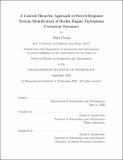A Control-theoretic approach to forced response system identification of rocket engine turbopump cavitation dynamics
Author(s)
Chang, Mark,S.M.Massachusetts Institute of Technology.
Download1227279068-MIT.pdf (10.23Mb)
Other Contributors
Massachusetts Institute of Technology. Department of Aeronautics and Astronautics.
Advisor
Zoltán S. Spakovszky.
Terms of use
Metadata
Show full item recordAbstract
High performance turbopumps are used in many rocket propulsion systems to reduce the weight and cost of the system. However, to meet these weight conditions and the demands of the rocket engine, turbopumps must operate at high speeds and low inlet pressures. This can lead to cavitation in the turbopump inducer. There are several distinct types of cavitation dynamics. Of concern to this project is cavitation surge which are planar oscillations in the flow that occur at frequencies usually 0.1 - 0.3 times rotor frequency. Cavitation surge can cause the turbopump to modulate the mass flow into the rocket engine combustion chamber and thus yield variations in engine thrust. This in turn can lead to self excited fluid-structure oscillations and POGO instability which can result in mission failure. Characterization of the cavitating inducer dynamics is critical to the design of the propulsion system so as to guarantee sufficient stability margin. This thesis introduces a control theoretic modeling framework that captures the free response cavitation dynamics of turbopump inducers. The reduced order framework was then used to guide the design of a forced response experiment. The design of experiment included the placement of sensors, a piston actuator, and an accumulator to ensure high signal to noise ratio and coherence. Forced response experiments were carried out to experimentally validate the model, and to characterize the cavitation surge dynamics. The experiments identified challenges with the test facility, specifically vibrations of the piping and support structure which induced large fluid perturbations. Due to time constraints and COVID-19, a second test was not possible. This thesis provides useful guidelines and best practices paving the way for future forced response system identification experiments.
Description
Thesis: S.M., Massachusetts Institute of Technology, Department of Aeronautics and Astronautics, September, 2020 Cataloged from student-submitted PDF of thesis. Includes bibliographical references (pages 163-164).
Date issued
2020Department
Massachusetts Institute of Technology. Department of Aeronautics and AstronauticsPublisher
Massachusetts Institute of Technology
Keywords
Aeronautics and Astronautics.